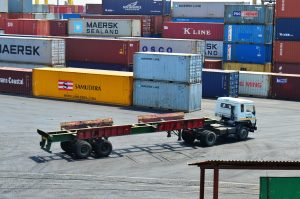Amid declining foreign exchange reserves due to rising import bills, Bangladesh has sought a $4.5 billion loan from the International Monetary Fund (IMF).
According to economists, who participated in a recent discussion at the Centre for Policy Dialogue in Dhaka, Bangladesh is facing an “economic crisis,” one that will not end soon as the global economy is roiled in turmoil too.
The crisis was not unexpected, it seems. “We expected a deterioration in the current-account deficit due to lower remittances, lower demand for exports, and of course high fuel and food prices,” according to a sovereign analyst at Moody’s in Singapore.
On July 27, Bangladesh Prime Minister Sheikh Hasina claimed that the crisis was not imminent. The country has enough foreign exchange reserves to import food for six to nine months, she said. “We have money in our hands to import food grains and others (essential items) for at least three months during any crisis.”
However, signs of an economic crisis are evident. The cost of the U.S. dollar against the Bangladeshi taka has risen sharply and the Bangladeshi currency is being devalued almost every week. A dollar, which was worth around 85-90 takas in May, is now being sold at 112 takas in the kerb market.
Bangladesh’s forex reserve fell to below $40 billion recently for the first time in two years. Amid the COVID-19 pandemic, forex reserves exceeded the $48 billion mark in August 2021, the highest ever in Bangladesh’s history. It has been declining since then.
This is largely because of the trade deficit. Even though export earnings hit a record high of $52.08 billion in fiscal year 2021-2022, the trade deficit also recorded a high of $33 billion. The high trade deficit is to some extent a fallout of the Russia-Ukraine war, which has affected food and fuel supply across the world. Global inflation has been affecting Bangladesh’s reserves too.
Foreign remittances are Bangladesh’s lifeline. According to the World Bank, Bangladesh is the seventh highest remittance recipient country in the world. Its remittance inflows hit a record high of $24.77 billion in fiscal year 2020-21 but fell to $21.03 billion the following year.
Bangladesh is listed as one of the 30 leading money laundering countries in the world. Some analysts describe this problem as the cancer of its economy. According to the U.S.-based think tank, Global Financial Integrity (GFI), Bangladesh is among the countries that are worst affected by the scourge of trade-based money laundering. GFI statistics indicate that Bangladesh launders an average of $7.53 billion each year through international trade.
A recent report of the Swiss National Bank (SNB) says that “the amount of money deposited by Bangladeshis in various banks in Switzerland stood at 871.1 million Swiss francs” (around $916.92 million) at the end of 2021. The report reveals that the amount increased by $310 million in just one year.
At present, Bangladesh has over $90 billion in foreign debt. Its debt doubled over the last five years due to the implementation of mega infrastructure projects. These projects, which are part of the Awami League (AL) government’s “More Development Less Democracy” strategy, enabled the AL to manipulate and win general elections in 2014 and 2018.
These mega projects could now become a major source of concern for the government. It will have to find the foreign exchange to repay debts incurred on these projects.
According to Debapriya Bhattacharya, distinguished fellow at CPD and convener of the Citizen’s Platform for SDGs, “Bangladesh may face major shocks in 2024 and 2026 in regards to its foreign debt repayment of 20 major mega projects.” This amounts to around $43 billion owed mostly to Russia, Japan, and China.
With an economic crisis looming, the Bangladeshi government has begun taking measures to curb foreign exchange spending. The Bangladesh Bank has tightened its import policy for luxury and non-essential items like sports utility vehicles, washing machines, and air conditioners.
Meanwhile, the Hasina government is cutting the expenditure of its officials. Overseas trips of government officials have been canceled. They have been asked to cut their use of electricity by 20 percent and limit the number of vehicles they use.
As part of its austerity measures, Hasina has called for scheduled electricity power cuts across the country, although her government celebrated 100 percent electricity coverage for the first time in the history of Bangladesh in March. Some power stations have been shut down to cut down on fuel consumption.
In addition, the government has categorized its development projects into three groups. Nearly finished projects (A category) will be continued, while B category projects can only use up to 75 percent of their budget. Category C projects will remain suspended till the economic crisis eases.
The AL government has started taking measures in anticipation of an economic crisis. Will it prevent Bangladesh from going the Sri Lanka way?

































